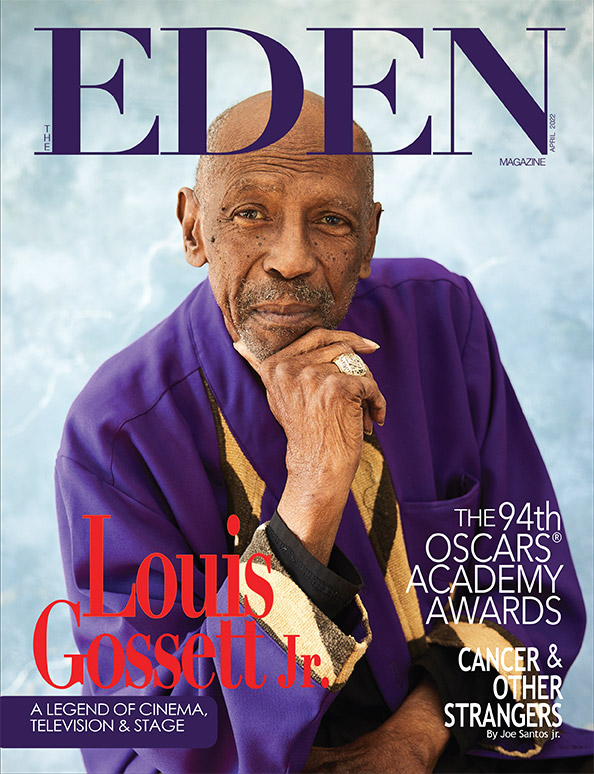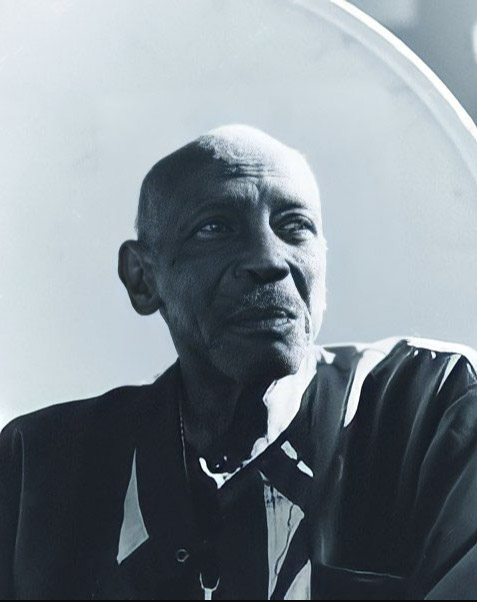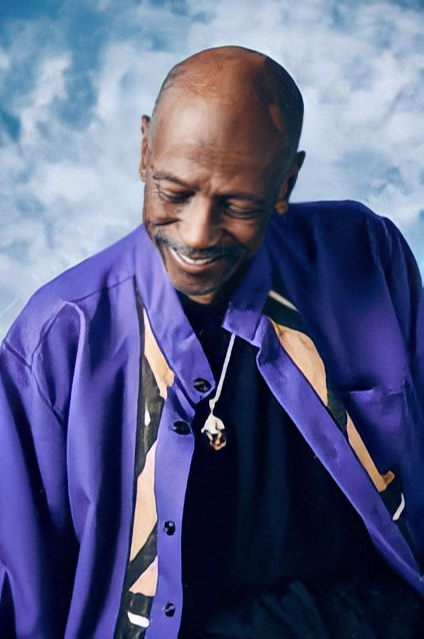
Louis Gossett Jr.
Louis Gossett Jr. is a legend of cinema, television, and stage, with an Academy Award for his role in An Officer and a Gentleman, an Emmy for the TV show Roots, a Golden Globe for The Josephine Baker Story, recipient of an NAACP Image Award, a star on the Hollywood Walk of Fame, author of his bestselling autobiography, An Actor and a Gentleman, and accomplished producer and director.
A few years ago, Gossett moved away from the hustle and bustle of New York and Hollywood and happily settled in Atlanta, Georgia, a place he often visited as a child and now calls home. He continues to work as an actor and finds time to savor all that life offers.
He is quite the raconteur, paying great attention to detail, and animatedly shared many fascinating and heartwarming stories about his humble beginnings in Brooklyn, extensive and colorful Hollywood career, love of music, and mission for confronting and eradicating racism with his foundation, The Eracism Foundation.
Read Our Magazine…
In February 2020, just before the pandemic, I had the privilege of seeing you in The Cuban, directed by Sergio Navaretta, at the Pan-Asian Film Festival in Los Angeles. Your performance was remarkable, a real tour-de-force. Please tell me what convinced you to take on this challenging and demanding role?
I look for demanding roles, but this one, in particular, was something I really wanted to do. I had seen Robert De Niro play a character in the film Awakenings where he was in a nursing home and suffers from memory loss. My character in The Cuban suffers from Alzheimer’s. DeNiro was having an Alzheimer’s attack and went from 55yrs old to 15 and back to 55 in no time because of the disease. So, after seeing that movie, I said, I want to see what it feels like to play that role. So, I investigated, and suddenly, the same character came to me in my lap. It was such a pleasure working up in Canada, just outside Toronto, with the director Sergio Navaretta and Alessandra Piccione (the film’s writer) and getting to know their family. They are my favorite Canadians!
What are some of your memories of growing up in Brooklyn?
Looking back on that time, I have to say I was blessed for how I was raised. I grew up in Brooklyn, Coney Island – Brighton Beach and attended high school in the early fifties. My neighborhood was populated by Europeans running away from Hitler – artists, intellectual cream of the crop, professors, filmmakers, and aggressive thinkers. People like Dalton Trumbo, Tallulah Bankhead, Willian Bendix, Elia Kazan. Some other people from my neighborhood that I saw growing up were the likes of Danny Kay, Arthur Miller, Neil Simon, Carol King. We were very poor – depression children. But I was not raised as a second-class citizen. My parents were, but they found this neighborhood where I grew up, and things were different. There was no racism growing up. We took care of one another. If I wasn’t home in time for supper, I had a choice. I’d go upstairs and get some gefilte fish or go across the street and get some spaghetti and meatballs.
When was the first time you encountered racism?
In 1966, this free black kid didn’t know anything about racism. I mean, I had read about Martin Luther King and all that was going on, but it felt like it had nothing to do with me. So, along came Lew Wassermann, who had opened up Universal Studios and was also an agent. He sent for me to go to Hollywood to do the first Movie of The Week at Universal, called Companions in Nightmare. I had never been to Hollywood.
They flew me out first class and put me up at the Beverly Hills Hotel in the presidential suite. They gave me a rental car I had to go pick up on Sunset Blvd. in Hollywood. It was a white Ford Galaxy 500 convertible EL. So, this black kid who knew nothing about racism is driving with the top down along Sunset Boulevard from Hollywood to Beverly Hills in the middle of summer. I was playing Sam Cook music as loud as I could. Typically, it takes 20 minutes to get to the hotel from that car rental place. It took me four hours! I met every police officer along the way. They all stopped me and questioned me for some time and wanted to know who the heck I thought I was. So, after eight hours of being stopped, carded, and put face down on cars, I finally arrived at the hotel in tears. The hotel manager saw how disturbed I was and asked what was wrong. After I told him, he felt terrible for me. He handed me a booklet (Map to the Stars), then told me to get my camera and take a drive to look at movie stars’ homes. Within 45 minutes of driving around, the police came and handcuffed me to a tree, where I stayed for three hours. That was my first day in California. I got on the phone and called my mother and father. They told me to get back home to New York. I then called my agent and told him what had happened and that I was thinking of going back. He said, “What are you going to do?” I said, “I guess I’m going to go to work.” He said, “That’s what I expect you to do!”
My first day of shooting was a sum total of that experience. My heart was broken. I did the best I could. Fade out. Fade in. Poetic justice. I won an Emmy for my role in Roots. Yet, here I am, the total of all those experiences globally. That childhood convinced me even today that we need one another desperately for mutual salvation.
In 1982, you won an Academy Award® for the role of Gunnery Sergeant Emil Foley in An Officer and a Gentleman. It was your first major nomination and win. Looking back on that time, what do you recall about that experience?
 Yes, it was my first major nomination and win for an Oscar, and it came right after Sidney Poitier won his. Now, most people believe Sidney Poitier was the first African American male to win, but technically, I was the first. This is because Sidney was born in Florida, on a shopping trip from the Bahamas, and so legally, he was American, but he was Bahamian. Before me, however, Hattie McDaniel was the first African American to win.
Yes, it was my first major nomination and win for an Oscar, and it came right after Sidney Poitier won his. Now, most people believe Sidney Poitier was the first African American male to win, but technically, I was the first. This is because Sidney was born in Florida, on a shopping trip from the Bahamas, and so legally, he was American, but he was Bahamian. Before me, however, Hattie McDaniel was the first African American to win.
You were a gifted athlete, yet you became an actor. How did you first find acting?
My English teacher Gustav Bloomberg, from Czechoslovakia, was a Broadway icon but was forced to run from the Blacklist. He always read the trades. One day he said to me, “Hey, Louis, they’re looking for somebody to play a part in a Broadway show. I know you’ve never acted. Never seen a play. Go down on Sunday. What can you lose?” So, on Sunday, my mother and I went down to the Lyceum Theater on 44th St. We walked in. It was dark—only one light on the stage. Voices were coming out of this dark area in the theater. Then somebody there started to giggle, which broke my feelings. I turned around, walked out, and started heading towards the subway. Someone came running after us and yelled, “wait.” It was a young man who looked like he could have been family. His name was Louis S. Peterson. We stopped. He said, “Forgive me. It was me who was laughing at you. I giggled because you looked just like me when I was your age. Please come back.” I went back. It turns out he and his wife, Peggy Feury, were charter members of the Actors Studio and also taught acting. We sat down and talked for about an hour. They told me all about what they did and said they would take a chance on me. I must say, I was very bored with what they were talking about because I had no idea about acting and acting classes. The only thing I did do artistically, at the time, in front of people, was sing gospel music with the intermediate choir at the First Baptist Church of Coney Island. But Louis and Peggy took me in and taught me acting through the entire summer of 1952. And then, on Labor Day, in 1953, there I was, opening in a play at the Forest in Philadelphia. I was too dumb to be nervous. It was a full-house, and I was playing a lead in a Broadway show called Take a Giant Step. Some of the greatest actors and actresses I’ve ever met were on stage with me.
I got a standing ovation and received the best newcomer award. I won it over James Dean, John Kerr, Ben Gazzara, and Anthony Franciosa. Of course, I had no idea how famous they were. For the next five to seven years, I played many wonderful roles and then acting really started getting into my system.
What is something that has surprised you about yourself?
 The thing that has surprised me the most is that as an actor, I have the ability to go right into character. I can be in front of a lot of people and go right into a character. I go and hide in those characters and in between some of them. This was all something I was a natural at, but my studies where I learned my craft was at the Actor’s Studio with people like Eli Kazan and a lot of others. They gave me the instrument to go deep into the character. If I had to play a juvenile delinquent, I became a juvenile delinquent. I became anything I needed to become. I have also done a lot of Shakespeare and submerged myself involuntarily into those characters.
The thing that has surprised me the most is that as an actor, I have the ability to go right into character. I can be in front of a lot of people and go right into a character. I go and hide in those characters and in between some of them. This was all something I was a natural at, but my studies where I learned my craft was at the Actor’s Studio with people like Eli Kazan and a lot of others. They gave me the instrument to go deep into the character. If I had to play a juvenile delinquent, I became a juvenile delinquent. I became anything I needed to become. I have also done a lot of Shakespeare and submerged myself involuntarily into those characters.
Is there a role you’ve always wanted to play, never had the chance to, and still yearn to do so?
I always wanted to play Dr. Kwame Nkrumah, Ghana’s first president, and Othello. Over the years, I have gotten a chance to play play many great characters in dream roles on stage, film, and television. I played Anwar Sadat, Patrice Lumumba, and even a character from another planet in Enemy Mine, to name a few. I am very grateful to have been accepted by an international group of people worldwide.
Are there any charities or causes that impassion you?
Yes. The elimination of racism of all kinds. The name of my foundation is called ERacism. It’s known internationally. The goal is to remove from existence the belief that one race is superior to another and remove racism of all kinds. We must do it together. If we don’t, we’re all going to lose.
Most people don’t know that you are also a singer/songwriter. Do you find time to jam or record music? And, given the opportunity, is there someone with whom you’d like to perform and collaborate?
Yes, I still play and write music. I have one album that’s about 30 years old called From Me to You. I have written over 200 songs. The first song I wrote with my friend Richie Havens, a great folk singer, was called Handsome Johnny. I played guitar. It was during the time when all the folk artists were making a name for themselves.
Richie and I were on our way to Woodstock to perform. We had to take a helicopter to get there because the traffic was terrible with all the people heading there. Richie’s first song at Woodstock was Handsome Johnny, an antiwar song. I got goosebumps because he was singing my song first! It’s on an album called Mixed Bag. The residuals from that song kept me from being homeless in California. I received the check for $70,000 on the same day I was being evicted. So basically, my music, and a song I wrote about war, kept me from being homeless in the streets.
Regarding an artist I’d like to collaborate with, I’m looking forward to working with Stevie Wonder one day. Even though he doesn’t know that I’m a singer/songwriter, I’d still very much like for that to happen.
What is God to you? And, how do you experience God every day in your life?
My great-grandmother raised me. She was from the south. She believed so much in God and knew that sometimes I didn’t. She said some very important words to me that have stayed with me my whole life, “whenever nothing is wrong, everything goes wrong. You believe in God. And he will deliver you.” I pray because there have been some negatives in my life, and I have found that I need to pray bad stuff away. On a daily basis, prayer helps me to know the difference between the devil and God. When I listen, everything is fine. When I don’t, it’s not fine.
What’s needed now for us at a soul level to raise our
vibration?
We need to drop the conflicts. Whatever we were raised with, the prejudices towards other cultures and races, we have to drop it all. The resentments, the stuff that makes us cry or get us upset, we’ve got to throw it away because the only thing we have left is one another. We have to love one another. God has sent us a gauntlet, and that gauntlet is a pandemic. The only way we can defeat it is if we do it together.
Are there any sage words you’d like to impart on the youth of today?
We need to drop the conflicts. Whatever we were raised with, the prejudices towards other cultures and races, we have to drop it all. The resentments, the stuff that makes us cry or get us upset, we’ve got to throw it away because the only thing we have left is one another. We have to love one another. God has sent us a gauntlet, and that gauntlet is a pandemic. The only way we can defeat it is if we do it together.
Are there any sage words you’d like to impart on the youth of today?
My motto to young people is, ‘there is no such thing as impossible.’ And ‘whatever you do, do it for the benefit of the whole family.’
What’s next for you?
I’m at a different point in my life, so I’m being offered some wonderful age-appropriate roles, and I’m having a great time playing them. It’s a good time in my life. I’m busy with my foundation E-Racism, and my Podcast, called For What It’s Worth. And because of that, I’m being received by these young people in universities. They put their cell phones away and let me speak for 15 minutes about this critical issue. I enjoy it a lot. I’m having a second career with it. And, of course, I continue to play my music. And I’m open to whatever God has in store.
Special Thanks to:
Louis Gossett Jr.
Photography:
Ben Rollins
The Cuban images
Sergio Navarretta

Comments